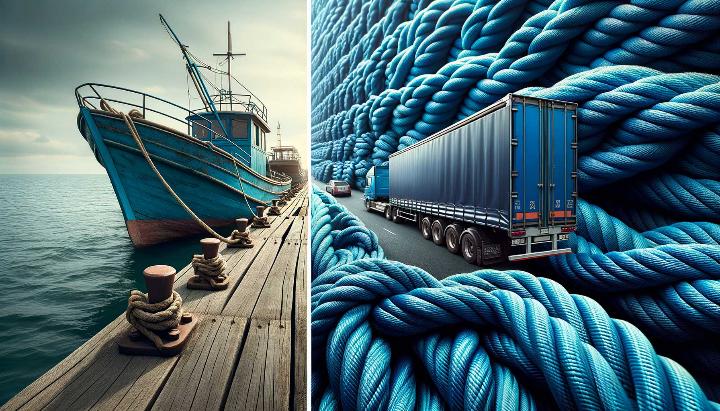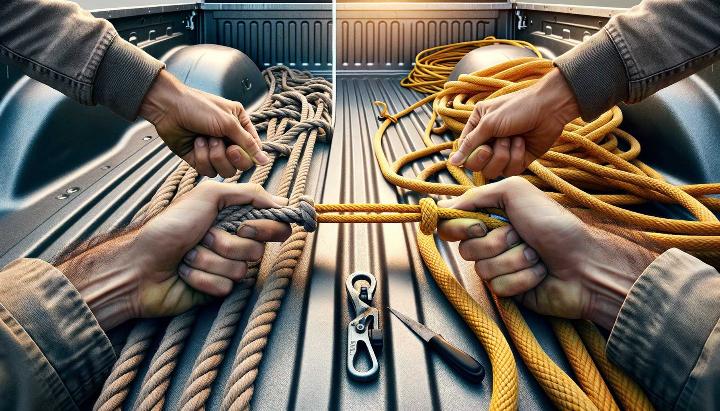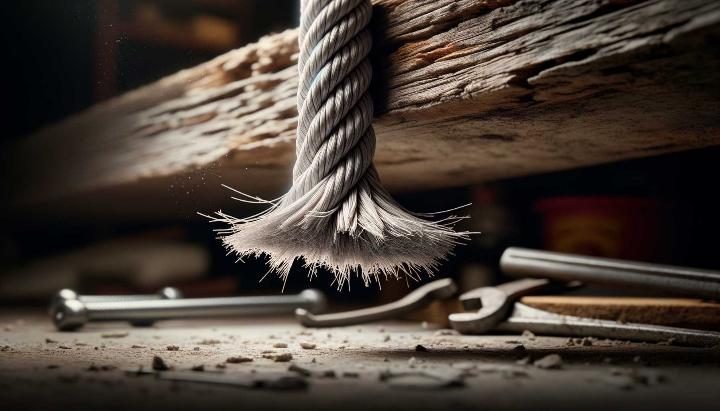Have you ever found yourself in a bind, quite literally, because you chose the wrong rope for the job? Whether you're a seasoned sailor, an off-road enthusiast, or a DIY weekend warrior, selecting the right rope can make or break your project. Today, we're diving into the world of cordage to explore two popular options: blue poly rope and elastic bungee rope.
At iRopes, we've spent 15 years crafting over 2,348 types of cordage for every application imaginable. From the depths of the ocean to the heights of industrial rigging, our expertise spans across marine, racing sports, industrial, and safety sectors. But why should you care about the rope you choose?
Imagine securing your boat with a rope that deteriorates in saltwater, or trying to strap down cargo with a line that has no give. The consequences could be disastrous. That's why we're here to unravel the mysteries of good rope choices, focusing on the versatile blue poly rope and the dynamic elastic bungee rope.
In this post, we'll explore the unique advantages of each rope type, helping you make an informed decision for your specific needs. Whether you're looking for durability, flexibility, or cost-effectiveness, we've got you covered. So, let's get knotty and discover why the right rope is more than just a tie that binds – it's a lifeline to success in your projects.
Advantages of Blue Polypropylene Rope
When it comes to choosing the right rope for your needs, blue polypropylene rope stands out as a versatile and reliable option. As someone who's spent countless hours working with various types of cordage, I can tell you that blue poly rope has some impressive advantages that make it a favorite among professionals and DIY enthusiasts alike.
Key Properties and Uses of Blue Poly Rope
Blue polypropylene rope boasts a unique set of properties that make it suitable for a wide range of applications. Have you ever wondered why you see so much blue rope at marinas and construction sites? Let me break it down for you:
- Rot-proof and moisture-resistant: Unlike natural fibre ropes, blue poly rope won't deteriorate when exposed to water or damp conditions.
- Floats on water: This property is a game-changer for marine applications, making it easy to spot and retrieve if it falls overboard.
- Lightweight yet strong: Don't let its light feel fool you – this rope can handle substantial loads without adding unnecessary weight to your gear.
- Versatile applications: From mooring boats to securing loads on trucks, blue poly rope is a jack-of-all-trades in the world of cordage.

Durability and Weather Resistance of Blue Polypropylene Rope
One of the standout features of blue poly rope is its exceptional durability in harsh conditions. I once left a length of this rope exposed to the elements for an entire Australian summer – scorching sun, heavy rains, you name it. When I checked on it months later, it was still in great nick, with minimal signs of wear and tear.
Here's what makes blue polypropylene rope so tough:
- UV resistance: The blue colour isn't just for show – it helps protect the rope from harmful UV rays, extending its lifespan outdoors.
- Chemical resistance: Whether you're working with solvents or need to use the rope in industrial settings, it holds up well against many chemicals.
- Abrasion resistance: This rope can take a beating without fraying or breaking, making it ideal for rugged use.
But here's a pro tip: while blue poly rope is incredibly durable, it's not indestructible. Regular inspections and proper storage can significantly extend its life. Have you considered creating a dedicated space for storing your ropes when not in use?
Cost-Effective Solution
Blue poly rope offers excellent value for money, balancing durability with affordability.
In my experience, the cost-effectiveness of blue polypropylene rope is hard to beat. Its longevity and versatility mean you get more bang for your buck compared to many other rope types. Whether you're outfitting a small sailboat or securing scaffolding on a construction site, blue poly rope provides a reliable and economical solution. To delve deeper into the applications of blue polypropylene rope, consider exploring our guide on Versatile Uses for Blue Polypropylene Rope.
So, next time you're in the market for a good rope, give blue polypropylene a go. Its combination of strength, durability, and versatility might just make it your new go-to for all your rope needs. Have you used blue poly rope before? What was your experience like?
Benefits of Elastic Bungee Rope
When it comes to versatile and dynamic rope solutions, elastic bungee rope stands out as a true game-changer. As someone who's worked with various types of cordage for years, I can tell you that bungee rope offers unique advantages that set it apart from traditional ropes. Let's dive into the stretchy world of elastic bungee rope and discover why it might be the perfect solution for your next project.
Versatility and Applications of Elastic Bungee Cords
Elastic bungee rope, also known as shock cord, is a jack-of-all-trades in the world of fastening and securing. I've seen it used in countless situations, from camping trips to industrial settings. Here are some standout applications:
- Cargo securing: Whether you're tying down gear on a ute or securing items on a boat, bungee rope's flexibility makes it ideal for oddly shaped loads.
- Tent and tarp setup: The elasticity allows for quick and easy adjustments, perfect for those windy camping nights.
- Sports equipment: From securing kayaks to rigging sailing equipment, bungee rope's shock-absorbing properties shine.
- DIY projects: I've even used bungee rope to create unique, flexible storage solutions around the house.
Have you ever struggled with a rigid rope that just wouldn't cooperate? Elastic bungee rope solves that problem, adapting to your needs with its stretchy nature. For detailed safety tips and proper usage, you might find our article on Mastering Elastic Bungee Cord Safety useful.

Strength and Durability Advantages
Don't let the stretchiness fool you – elastic bungee rope is tough as nails. Made from materials like rubber and polypropylene, these ropes are built to last. Here's what makes them so durable:
- Impressive stretch factor: Most bungee ropes can stretch between 100% to 125% of their original length under heavy loads, storing potential energy like a spring.
- Weather resistance: Unlike some traditional ropes, bungee cords handle sun, rain, and temperature changes like a champ.
- Shock absorption: The elasticity means less wear and tear on both the rope and the items it's securing.
I once used a set of bungee ropes to secure a load on a long-haul trucking job. Even after thousands of kilometres and varying weather conditions, those ropes were still as springy and strong as the day we set out.
Cost-Effectiveness Compared to Alternatives
When it comes to value for money, elastic bungee rope is hard to beat. Here's why:
- Longevity: The durability of bungee rope means you'll replace it less often than traditional ropes.
- Versatility: One set of bungee ropes can replace multiple specialised tying solutions, saving you money in the long run.
- Time-saving: The ease of use means quicker setup and breakdown times, which can translate to cost savings in professional settings.
Safety First
Always inspect your bungee ropes before use and follow proper safety guidelines to prevent accidents.
While elastic bungee rope offers numerous benefits, it's crucial to use it safely. Always check for wear and tear, use appropriate hooks or fasteners, and never overstretch the rope beyond its capacity. Remember, the right tool for the job is the safest tool for the job.
Have you used elastic bungee rope in your projects? I'd love to hear about your experiences and any creative applications you've found for this versatile cordage. Share your thoughts in the comments below!
Essential Factors for Choosing the Right Rope
Selecting the perfect rope for your needs isn't just about grabbing the first coil you see at the hardware store. As someone who's spent years working with ropes in various industries, I can tell you that choosing the right rope can make or break your project - sometimes literally! Let's dive into the essential factors you need to consider when picking out your next rope.
Understanding Rope Types and Their Applications
The world of ropes is vast and varied, with each type serving specific purposes. Here's a quick rundown of some common rope materials and where they shine:
- Nylon: Known for its impressive strength and elasticity, nylon ropes are perfect for dynamic loads like climbing or boating.
- Polyester: Less stretchy than nylon but more resistant to UV damage, making it ideal for long-term outdoor use.
- Polypropylene: Lightweight and water-resistant, it's great for marine applications where buoyancy is key.
- Wire rope: When you need serious strength and durability, wire rope is the go-to for heavy industrial applications.
But here's the thing - knowing the material is just the start. The real magic happens when you match the rope to your specific needs. For instance, I once saw a DIY enthusiast use a thin polypropylene rope for a heavy load-bearing project. Let's just say it didn't end well!

Key Characteristics to Consider When Selecting a Rope
Now, let's talk about the nitty-gritty details that can make all the difference in your rope selection:
- Strength: This is crucial. Rope strength is typically measured in tons of 2,000 lbs. Always choose a rope with a breaking strength well above your intended load.
- Diameter: It's not just about thickness. The diameter affects weight, durability, and how easy the rope is to handle. Think about the hands that'll be working with this rope.
- Environmental factors: Will your rope be exposed to sunlight, salt water, or chemicals? These can dramatically impact a rope's lifespan.
- Stretch factor: Some applications need a rope that won't budge, while others benefit from a bit of give. Know your needs!
Here's a pro tip: when assessing rope quality, don't just rely on looks. Feel the rope in your hands. Is it smooth or rough? Flexible or stiff? These tactile qualities can tell you a lot about how the rope will perform.
Safety First
Never compromise on rope quality when safety is on the line. Your rope choice could be a lifesaver.
Remember, the right rope isn't just about getting the job done - it's about getting it done safely and efficiently. Whether you're rigging up a sailboat or securing a load on a truck, taking the time to choose the right rope will pay off in the long run. For those looking to explore a wide range of rope solutions, including synthetic options, visit our article on Leading Rope Manufacturing Company iRopes.
Have you ever had a rope let you down (hopefully not literally)? Or maybe you've found the perfect rope for a tricky job? Share your experiences in the comments below - your story might just save someone else from a rope-related mishap!
```htmlSelecting a good rope is essential for meeting specific application demands, and iRopes, a leading manufacturer with 15 years of experience in China, offers just that. When it comes to blue poly rope, its durability, UV resistance, and versatility make it ideal for marine and industrial uses. Meanwhile, elastic bungee rope's shock-absorbing properties are perfect for securing loads with stretchability and flexibility. Both rope options highlight iRopes' commitment to quality, featuring strong synthetic fibres and various coating options, showcasing the exceptional craftsmanship of "Made in China."
Explore Our Tailored Rope Solutions
Above, you'll find our inquiry form. We encourage you to fill it in to learn more about how iRopes can provide the ideal rope solutions tailored to your unique needs. Whether it's blue poly rope for toughness or elastic bungee rope for versatility, our expertise ensures you’ll find the perfect match for your projects.
```